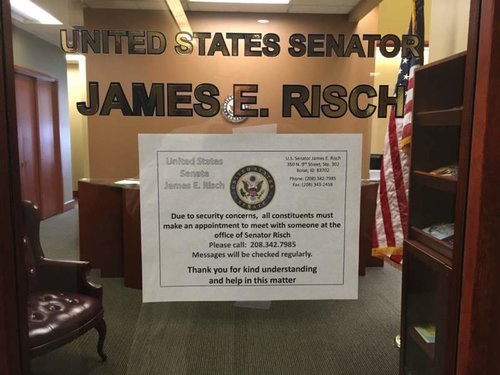JoseCuervo
New member
Good news is "public lands should remain public".
Bad news is he didn't say "FEDERAL public lands should remain FEDERAL public lands".
Not sure what "all Idahoans should enjoy REASONABLE access" means. Should not be limited to "Idahoans" (splitting hairs, perhaps) and the term "reasonable" is an interesting legal term.
AGain, this letter was generated in response to the 45 seconds I spent on http://sportsmensaccess.org/ filling out the TRCP form.
(Still missing in action for responses: Rep Labrador, and Sen. Risch.)
Bad news is he didn't say "FEDERAL public lands should remain FEDERAL public lands".
Not sure what "all Idahoans should enjoy REASONABLE access" means. Should not be limited to "Idahoans" (splitting hairs, perhaps) and the term "reasonable" is an interesting legal term.
AGain, this letter was generated in response to the 45 seconds I spent on http://sportsmensaccess.org/ filling out the TRCP form.
Dear Jose:
Thank you for contacting me regarding the management and ownership of our public lands. I appreciate hearing from you and welcome the opportunity to respond.
I agree with you that, put simply, public lands should remain public. Their values should be preserved and enhanced, and all Idahoans should be able to use and enjoy reasonable access to them. However, in too many cases the federal government is not doing a good job in managing lands under its ownership, and many Idahoans can point to specific examples they have personally experienced or witnessed.
State and federal lands management laws and processes too often drive us to conflict and litigation, and should be reformed to allow more participation-in and influence over management decisions by those closest to the land. State government, local officials and private stakeholders should be empowered to more meaningfully participate in the decision-making processes pertaining to our public lands. Outcomes from this collaborative, consensus building approach will be better for both the environment and the natural resource based economies of Idaho. These outcomes can result in administrative and/or legislative action on the public land in question. The Owyhee Initiative is an example of the kind of collaborative approach that respects the needs of all affected stakeholders by building on the knowledge that local communities have about the public lands that literally comprise their backyards.
The land management challenges facing Idaho and western states did not happen overnight. As such, it will take time, dedicated efforts and robust public participation to achieve the outcomes we all seek. I look forward to working with my colleagues in Congress to enact federal land management policies that maintain public access and ensure resilient, self-sustaining economies for our rural counties for years to come.
Again, thank you for contacting me. Please feel free to contact me in the future on this or other matters of interest to you. For more information about the issues before the U.S. Senate as well as news releases, photos, and other items of interest, please visit my Senate website, http://crapo.senate.gov.
Sincerely,
US SenatorSenator Mike Crapo
Mike Crapo
United States Senator
MDC:AE
(Still missing in action for responses: Rep Labrador, and Sen. Risch.)





